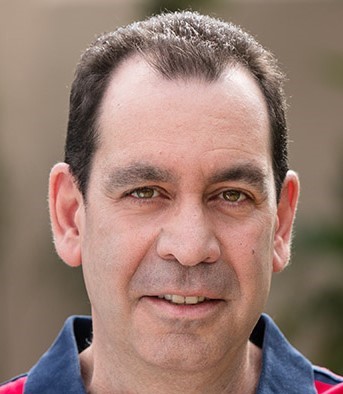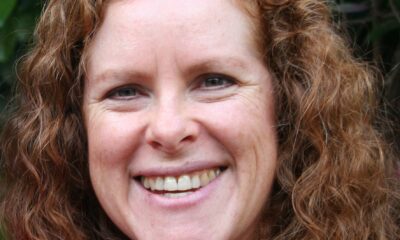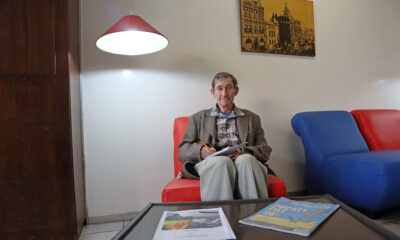
Lifestyle

Pandemic poet puts words to our predicament
Published
2 years agoon
Larry Borowitz may appear an unlikely poet, but appearances are deceiving. His first book of poetry, Poetry in the Pandemic, has just been published internationally. We speak to him:
Tell us briefly about yourself.
I was born and bred in Johannesburg, and went to King David Linksfield. I was mazkir klali and rosh machaneh of Habonim Dror for two years. I have university degrees in information systems. I also have a Lean Six Sigma Master Black Belt certification. My work experience includes consulting, leading systems and operations environments, and being a subject-matter expert in fields like quality, treating customers fairly, and data privacy. I’m intellectually curious and creative. I live in Johannesburg, and am married with a daughter and two sons.
What drew you to writing poetry, and when?
Over the years, I’ve composed music and written lyrics as a hobby. Some songs include a Habonim Machaneh camp song for one of the machanot, a song for my wife at our wedding, and a song my wife sang to our daughter at her Batmitzvah. Though I enjoy composing music, I’ve always enjoyed being creative with words. In terms of writing formal poetry, you could say the talent lay dormant, and the pandemic was the catalyst to liberate words and ideas.
What about writing poetry appeals to you?
Poetry brings rhythm and rhyme together. It enables the creation of imagery using a succinct form of writing. It allows deeper meaning to be captured in relatively few words, which keeps the reader engaged and encourages further analysis. It enables the use of language and punctuation in ways one feels like using at the time of writing, with no expected format. It also has an element of problem solving (such as deciding what words will work in a rhyming sequence) which adds to the enjoyment of creating the piece. If one is short of time – which I am – it provides the opportunity to pen one’s thoughts in a few hours, self-edit, and then circulate while having fun seeing a blank page transform into words with structure, depth, and meaning.
This is a book of poetry written during the pandemic. What exactly inspired it, and when did you find time to write it?
One Saturday morning in April 2020, when South Africa was in lockdown level 5, it was exceptionally quiet and I thought to myself, “I can hear myself breathe.” I thought this would make a good title for a poem. Since we were locked down with not much to do, I started writing the first poem of what has become an anthology. With the encouragement of my family, I posted the poem on Facebook and got an enthusiastic response from my friends. I realised I had a receptive audience across the world for the thoughts I wanted to express.
I wrote all the poems after working hours and on weekends. I used the time which was previously used for other leisure activities to write them.
How did the pandemic influence the content of the poems?
The poems cover a wide array of topics and themes. I’m an avid reader and used my general knowledge and observation of what was happening across the world to decide what subjects to write about. The poems range from the physical impact of COVID-19 on our daily lives to deeper subjects like purpose, identity, and loss.
When you started writing these poems, what did you hope to achieve?
Once I realised what a unique time we were all living through and that one day, future generations would ask what it was like to live through the COVID-19 pandemic, I thought I could leave a legacy for my children to share with their children in terms of what it was like to live through these extraordinary times.
How did you go about getting them published?
Since I had been writing a new poem every week, before I knew it, I had written more than 40 poems. I thought it was worth seeing if there was a publisher who would be interested in publishing the poems as an anthology. I found some publishers on the internet who were accepting new submissions, and I sent the poems off for consideration. After four weeks, I got an offer to publish, which I accepted. The process of publishing was much slower than I anticipated, so I was really pleased when Poetry in the Pandemic was finally available to the public at the end of January 2022.
What kind of response have you had?
I have had excellent feedback. Since I posted every Sunday on Facebook, I would get likes and positive comments, which would give me a sense whether that week’s poem resonated with my readers. Their enthusiastic response also motivated me to keep writing.
How has writing poetry helped you to deal with the pandemic?
It has been an excellent outlet to express my thoughts. When my world shrunk physically, it opened creatively. The poetry kept me in touch with other people (besides my immediate family) who I couldn’t see in person. It also re-connected me to people living overseas whom I hadn’t been in touch with for a while. I love listening to music while writing, so I have also extended my knowledge of music during the pandemic.
What impact did the pandemic and lockdown have on you and your family?
Besides one son having the Omicron virus, we were fortunate that my immediate and extended family remained healthy throughout the pandemic. I have exercised every week, and achieved certain goals by walking and running. This improved both my physical fitness and mental well-being. I also was very disciplined in that I would always get dressed properly for work – no shorts or slippers – which ensured that I always felt I was in “work mode” when working from home. My immediate family (wife and three children) kept each other company and had some special moments together (for example, the Pesach seders in 2020). In spite of the many challenges, like online teaching for my wife, a teacher, and learning (my kids were all studying), we adjusted to the changes and have emerged as a stronger family unit after the two years of the pandemic.
What’s your take-home message for people reading your poetry?
Appreciate life and what it offers. You need to be positive – no matter how difficult the circumstances. The poetry is like a mirror in which you can reflect on what happened in the first year of the pandemic. It describes how individuals, society at large, and leadership responded to the enormous challenges we faced.
Who do you believe it appeals to?
It should appeal to anyone of high-school age across the world due to its universal themes and the common human experience of living through COVID-19. I have always written with the reader in mind, and have endeavoured to make the poems relatable and relevant.
What does it take to write poetry?
A desire to share thoughts and ideas while giving the reader food for thought. You need to enjoy playing with words and rhymes. It’s important to be self-disciplined and not self-indulgent.
Are you still writing poetry, and can we expect another book one of these days?
Yes! Poetry in the Pandemic comprises the first 50 poems I wrote in the first year of the pandemic. I didn’t stop writing in the second year, and have continued to post a poem every week on Facebook. So I look forward to publishing my second book soon.
Larry Borowitz poems
Invisible
To the naked eye it’s invisible
From one to the other transmittable;
The naïve thought it impossible
For something which is not discernible
To spread like a plague so biblical
It’s easier to understand the physical
Than the concealed and conceptual;
Finding meaning only in the material
Results in decisions taken so political
Causing damage so irreversible
When lockdown makes you concealable
It is easy to have thoughts so cynical
That the world is no longer hospitable;
Spending so much time as an individual
Can make one feel inconsequential
When connecting to cyber and digital
Many weeks make you unrecognisable
The camera off keeps you disguisable
Muted mike to silence each syllable
Is your presence real or apparitional?
Exposing the imperceptible
Will create the medical miracle;
When to see and be seen is reciprocal
Life is so much more pleasurable;
To be visible is to be vincible!
Departed
Two million ships have sailed into the night
Circumnavigating the calm waters of heaven
Their anchors dislodged by the powerful storm
Submerged as they disappeared from our midst
When the tempest started, they were nameless
Foreign vessels lost in the darkness of the deep
As more and more craft joined the fatal flotilla
We recognised the familiar in the sea of names
Many not getting a loving farewell in the harbour
Unmoored by a force far beyond their control
As dawn breaks on the emptiness of the ocean
Waves of tears mourn those in the different realm.










